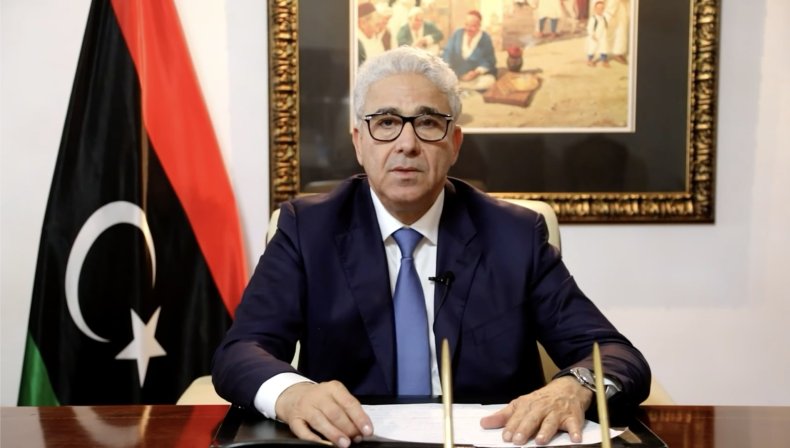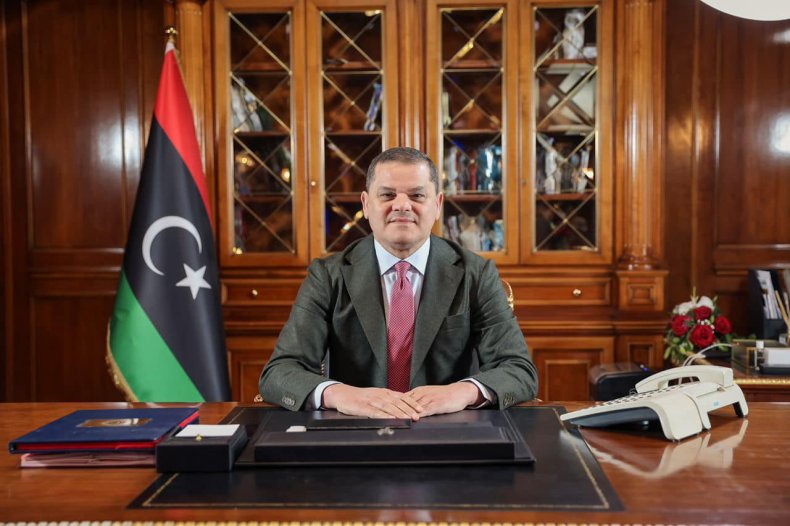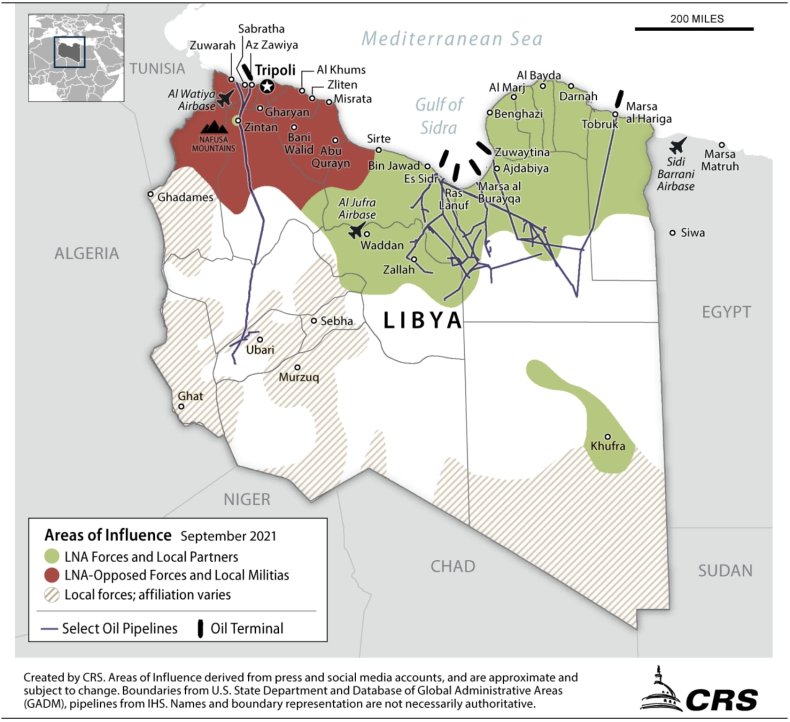Former Libyan Inside Minister Fathi Bashagha was sworn in final week as his nation's new premier by the Home of Representatives in what the parliament noticed as a step towards rebuilding their embattled nation.
However a whole bunch of miles west, alongside the Mediterranean shore of a North African nation beset by battle and crises for greater than a decade, Abdul Hamid al-Dbeibah, one other man who claims the title of prime minister, one nonetheless acknowledged by the worldwide neighborhood, rejected the transfer as illegitimate.
Such has begun yet one more setback for longstanding efforts to unify Libya, a rustic nonetheless dwelling within the tumultuous wake of a rise up backed by the U.S.-led NATO alliance to oust longtime chief Muammar el-Qaddafi in 2011. His unceremonious execution by the hands of the opposition, streamed worldwide on the web, was extensively celebrated on the time as heralding the beginning of a brand new period for this strategically essential North African nation, one free from the strongman who dominated Libyan politics for greater than 40 years.
What got here subsequent, nonetheless, was the rise of warlords, jihadi insurgencies and political infighting that continues to plague Libya, dividing it largely between the capital Tripoli, the place Dbeibah and his Authorities of Nationwide Unity sit, and town of Tobruk, the place the Home of Representatives' authority rests. When long-awaited elections didn't arrive in December, the Tobruk aspect declared Dbeibah's mandate null and void, finally selecting Bashagha to information Libya towards a nationwide vote.
Talking to Newsweek, Bashagha made the case for his place because it comes underneath problem by each Dbeibeh and Libya's Excessive State Council advisory physique.
"The federal government I've fashioned took place as a direct results of the earlier authorities's failure to carry clear elections," Bashagha mentioned. "I've dedicated to holding each presidential and parliamentary elections throughout the timeframe agreed upon between HOR and HSC."
As an added assurance that he didn't search to grab energy by undemocratic means, Bashagha mentioned he has "additionally pledged to not run to make sure the elections' transparency and neutrality."
"Planning elections in Libya means launching numerous initiatives together with nationwide reconciliation, financial reforms and biometric methods to safe voter knowledge," Bashagha mentioned. "These elections will take effort and collaboration, however I'm dedicated to seeing this course of by."
Amid fears that the most recent schism might return Libya to a interval of lively battle solely not too long ago quieted in October 2020, Bashagha vowed to not resort to violence to impose his will, even when Tripoli refuses to concede.
"We won't participate in any violent acts," Bashagha mentioned. "It has been confirmed that the options in Libya come by political agreements and dialogue. I intend to pursue collaboration and transparency to maneuver our nation ahead."
In an effort to allay fears of such violence, Bashagha and Dbeibah met on Friday, however failed to succeed in a long-lasting decision. And the current mobilization of armed factions loyal to either side has sparked fears the nation might as soon as once more be plunged into civil warfare.

Although Bashagha's mandate presently lies within the east, his personal roots are within the nation's west, within the port metropolis of Misrata, far nearer to Tripoli. As soon as thought-about to be the commerce capital of Libya, Bashagha himself labored within the import-export subject after leaving the Libyan Air Pressure of the Qaddafi period.
After the rebellion started, Bashagha joined the revolutionary navy council of his hometown, from which numerous Islamist militias would emerge in help of the Tripoli authorities and its Italian, Turkish and Qatari backers.
As he was shut with numerous Misrata's armed factions, Bashagha backed the central United Nations-installed authorities, because it went to warfare in 2014 with the domestically elected Home of Representatives. That group loved the firepower of the influential Discipline Marshal Khalifa Haftar and his Libyan Nationwide Military, together with various levels of help from Egypt, France, Russia and the United Arab Emirates, amongst others.
Bashagha remained for years within the camp of the Tripoli-based Authorities of Nationwide Unity, identified till final March because the Authorities of Nationwide Accord, and accepted the place of inside minister in 2018. However his relationship with then-Prime Minister Fayez al-Serraj soured, and Bashagha was suspended in August 2020 after his safety forces had been accused of firing on protesters throughout an indication within the capital.
As final yr's try to carry nationwide elections progressed, Bashagha fashioned a coalition with Home of Representatives chief Aguila Saleh Issa, whereas Dbeibah sided with Libyan Presidential Council Chair Mohammad Menfi. Dbeibah's listing topped Bashagha's 39 votes to 34 in a course of hosted by the U.N.-backed Libyan Political Dialogue Discussion board. However the precise election was postponed by Libya's Excessive Nationwide Electoral Fee, citing a disagreement over the method and continued unrest main as much as the deliberate vote.
Dbeibah has since outlined a plan to delay elections till June, however the Home of Representatives has argued the Libyan premier's time period successfully expired when elections didn't transpire. Although Dbeibah nonetheless retains the U.N.'s recognition, frustrations in Libya proceed to mount, and at the least three ministers have already resigned from the Tripoli administration over yet one more failure to kind a long-lasting post-Qaddafi management.
Regardless of Qaddafi's loss of life having put a violent finish to the self-proclaimed colonel's reign greater than 10 years in the past, the "brotherly chief" nonetheless looms massive within the nationwide consciousness of a Libya missing any enduring alternative.
Actually, among the many practically 100 aspiring presidential candidates, together with Haftar, whom Newsweek was unable to succeed in for remark, are Qaddafi's second son, Saif al-Islam el-Qaddafi, who survived the civil warfare and finally obtained a pardon from the Home of Representatives for alleged crimes dedicated as a key determine in his father's authorities.
Qaddafi's ticket continues to spark controversy, having been rejected after which reinstated, as Libya continues to return to grip with its previous, current and future within the absence of unified management.
Qaddafi — whose title is alternatively spelled in quite a lot of methods, together with Gaddafi and Gadhafi, the latter of which Saif al-Islam instructed Newsweek he most popular again in 2007—didn't reply to Newsweek's request for remark in time for publication.
Bashagha, for his half, instructed Newsweek he noticed "a number of components" contributing to Libya's lack of ability to get well from disaster for the reason that elder Qaddafi was ousted, "a very powerful of which is Libya's lack of infrastructure in some sectors."
"This made the restoration interval after the autumn of the Gaddafi regime for much longer than that of Tunisia and Egypt, for instance, along with damaging international intervention at occasions," Bashagha mentioned.
"We're dedicated to transferring Libya ahead," he added, "by rebuilding our inner infrastructures and essential alliances with our worldwide companions who can help this essential journey."
Wanting past Libya's borders, Bashagha mentioned he appeared ahead to cultivating relations with the West, amongst others, restoring his nation's place as an oil and gasoline participant, and dealing with all nations that don't meddle in Libya's inner affairs.
"Libya has essential partnerships with a number of international locations together with the U.S. and Europe," Bashagha mentioned. "For the primary time in 10 years there might be a critical funding within the vitality sector in Libya to boost manufacturing and contribute positively to the worldwide market. There might be a transparent technique for cooperation with international locations that respect Libya's sovereignty and that don't take part in any damaging actions inside Libyan soil."
However Bashagha's prospects for achievement within the vitality sector seem unsure, as Libya's Nationwide Oil Company suspended operations on the nation's two largest oil fields earlier this week after claiming that an armed group led by an area militia chief shut down essential valves. Fears that furthest unrest might ensue are amplified by the ominous nature of the rivalry between Dbeibah and Bashagha.
Each males have already survived obvious assassination makes an attempt, Dbeibah simply final month and Bashagha in December 2019 and February 2021. Now studies have emerged of militias loyal to either side getting ready for potential confrontation as Dbeibah refuses to cede energy.
Dbeibah's workplace didn't reply to Newsweek's request for remark. Libya's embassy in Washington mentioned it was "unable to offer a remark" and did "not have the contact info for the Prime Minister."

With additional turmoil possible, the United Nations stays a key drive in doubtlessly resolving the dispute between the 2 males and their respective administrations. U.S. diplomat Stephanie Williams is in place to take action, serving because the Secretary Common's particular adviser on Libya.
She instructed Newsweek, nonetheless, that this difficulty was a Libyan one, one which finally required a Libyan resolution.
"The United Nations is just not within the enterprise of recognizing or endorsing governments," Williams mentioned. "Such recognition is a sovereign matter determined upon by member states and in some situations, the U.N. Safety Council."
She indicated that, absent elections, neither the Tripoli or Tobruk administrations had a real mandate from a inhabitants longing to have its personal voice heard, as evidenced by the passion expressed by residents to truly take part in selecting their subsequent chief for the primary time.
"All the present establishments in Libya lack widespread legitimacy," Williams mentioned. "The one resolution is thru the poll field, and that is the overwhelming demand of the Libyan folks."
"That's the reason practically three million Libyans, out of an general inhabitants of roughly seven million, registered to vote," she added, "along with the truth that over 5 thousand candidates filed papers to run as candidates within the parliamentary elections, and virtually 100 Libyans filed to run for the presidential race."
As for Bashagha, who hopes to preside over this course of, Williams said that he was "a nationwide determine and his achievements communicate for themselves, together with his service as Inside Minister within the earlier authorities throughout which warfare was waged in opposition to the capital."
Williams mentioned she was providing to make use of her place to mediate within the dispute between Bashagha and Dbeibah in an effort to assist lastly usher in a brand new age of steady management that has eluded Libya since Qaddafi's downfall.
"I've supplied the nice workplaces of the United Nations to mediate a decision to the disaster over management of the chief authority," Williams mentioned. "I've additionally introduced an initiative to convene a joint committee of the Home of Representatives and the Excessive Council of State to ascertain a sound constitutional foundation in an effort to take the nation to nationwide elections as quickly as potential."
"Nationwide reconciliation and transitional justice are key objectives alongside Libya's pathway to restoration," she added, "after greater than a decade of division, battle and chaos."

